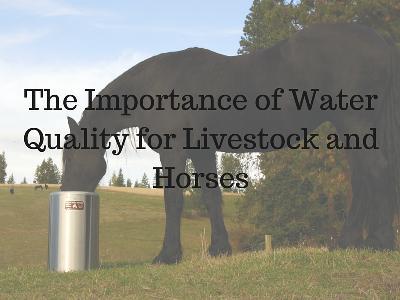The Importance of Water Quality for Livestock and Horses

Water is critical for life.
The average human body is made up of more than 60 percent water. We drink to replenish our fluid balance and maintain homeostasis. We drink to prevent dehydration. We drink to regulate our temperature and stay healthy.
Horses and livestock are no different, except they count on us for their care. Up to three quarter’s of a horses body is comprised of water; water accounts for up to 80 percent of cattle weight.
As a farmer and rancher, you know the importance of keeping your animals watered. Nelson’s Automatic Waterers make this task simple and straightforward.
With eight different models, our aluminum and stainless steel waterers are thermostatically controlled. And you’ll appreciate that they can be mounted three different ways: to a concrete pad or in a concrete pipe for the pasture or directly to your animal’s stall wall. You can also add an optional consumption indicator to track your animal’s water intake.
Animals can be finicky and it’s important you offer them plenty of fresh and clean drinking water. On average, a horse needs between 8-10 gallons of drinking water each day. And remember: You can lead a horse to water, but you can’t make him drink. Many horses, for example, won’t drink water if it’s filled with debris or particles. That’s where our automatic waterers come into play.
Our patented water valve provides a constant stream of fresh water, free of bacteria and algae. Our drinking bowls are made of stainless steel for easy removal, cleaning, and disinfection. And our optional heater will maintain the perfect drinking water temperature — most animals prefer temps ranging from 45-65°F — even during the coldest, most frigid winter months.
Are you ensuring the water quality for livestock and horses is optimal at your farm or stable? For more information on Nelson Automatic Horse and Livestock Waterers request a quote.
Có thể bạn quan tâm
 More understanding needed on feed ingredient, rumen interaction
More understanding needed on feed ingredient, rumen interaction Feed ingredient combinations and management practices remain areas for development and research in the US dairy industry, says long-time dairy nutritionist
 Bacillus-based feed additive may improve dairy milk efficiency, boost health
Bacillus-based feed additive may improve dairy milk efficiency, boost health The use of Bacillus pumilus in dairy cattle feed may improve milk production efficiency and improve health during transition.
 Formulating diets for individual cow needs more suited to smaller scale operations
Formulating diets for individual cow needs more suited to smaller scale operations With increasing competition and shrinking margins, producers need maximum efficiency on their dairies. Precision nutrition is said to help save labor costs
 Some forage diets may need added nutrition for dairy cows
Some forage diets may need added nutrition for dairy cows An international team of researchers reported results of trials examining nutrient requirements of dairy cattle on low forage proportion and high forage proport
 Rumen-protected folic acid may boost dairy cattle production, reproduction
Rumen-protected folic acid may boost dairy cattle production, reproduction Supplementing dairy cattle diets with rumen-protected folic acid may improve milk production, reproduction and boost intake.